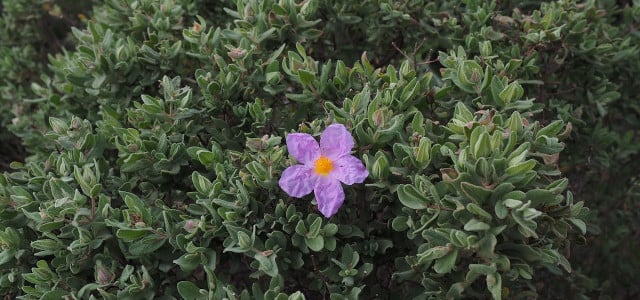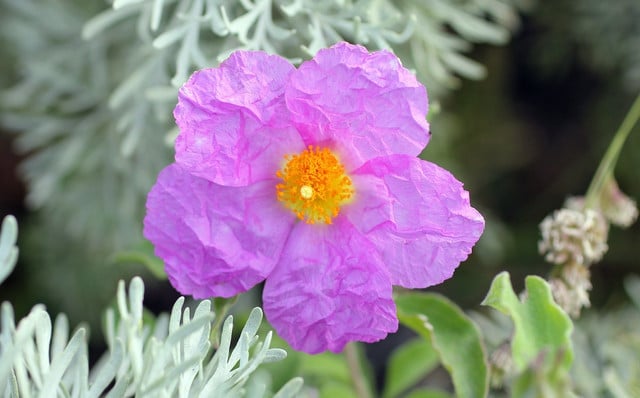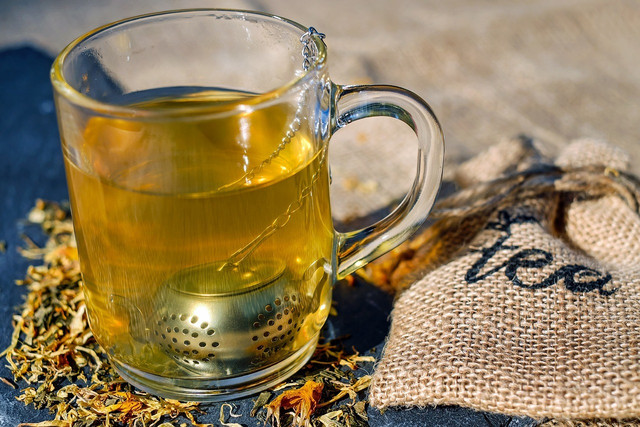
Cistus tea or rockrose tea strengthens our immune system thanks to antioxidants. You can read what science says about it and how to prepare the tea here.
Cistus tea is made from the leaves of the rockrose. Despite its name, the plant has nothing in common with roses, as they are part of their own genus, the rockrose family. There are a total of 20 different species within the family. The color of the crumpled flowers varies from white to pink to purple. The leaves are particularly sticky because they contain a lot of resin.
Since rockrose is considered a novel food in the EU, its use requires a novel food approval. This is currently only available for herbal tea made from the herb of the Cistus incanus L. Pandalis variety, which comes from the Mediterranean region. However, this regulation is considered controversial, since other types of rockrose have long been used as food and medicinal teas, especially in countries such as Greece and Turkey. The herb’s positive effect on health has also been scientifically proven.
You can buy organic cistus tea in well-stocked tea shops, pharmacies or organic markets. The tea is available online from Ecco Verde or Amazon, for example.
How Cistus tea works

(Photo: CC0 / Pixabay / Rhiannon)
Cistus tea contains antioxidants and has antibacterial and antiviral effects. The reason for this is the high polyphenol content of the medicinal plant. Polyphenols are secondary plant substances that have a positive effect on our health. A randomized study with a placebo control group was able to demonstrate that the infection symptoms of the group that was treated with cistus tea improved significantly faster.
Cistus tea helps in the following cases:
-
Cold, corona and flu-like effects: The rockrose ensures that pathogens do not continue to multiply. At least in the case of corona, an almost complete inhibition of virus growth was observed. Clinical studies have also shown that the plant’s extract is effective against flu viruses because it creates a protective film in the throat.
-
Inflammation in the mouth and throat: The tea can help as a mouthwash thanks to its antibacterial effect.
- For the same reason, cistus tea can also help with acne and neurodermatitis: carefully dab the cooled tea onto the affected area and allow it to take effect.
-
Beautiful skin: Here you proceed as if you were using it against acne and neurodermatitis. Apply the tea to the entire face. A study has shown the positive effect that rockrose can have on the skin.
- Cistus tea has also been considered a remedy for diarrhea for centuries: Cistus tea is said to protect the intestinal surface. The antibacterial and antivital effects of the medicinal plant also help.
By the way: In addition to cistus tea, you can also buy other medicinal products, such as lozenges, containing cistus in the pharmacy.
Preparation of cistus tea

(Photo: CC0 / Pixabay / Couleur)
Since rockrose is considered a novel food, you should not use more than three grams of the herb per day. Three grams make about two cups of tea. Here’s how to prepare it:
- Put a tablespoon of cistus tea into a tea infuser.
- Pour about 250ml of boiling water over it.
- Let the cistus tea steep for about five minutes.
The tea leaves can even be used twice – they don’t lose their taste. Only the polyphenol content, which is good for our health, is reduced. Cistus tea has a very intense taste. If you don’t like the taste, you can easily mix the tea with other types of tea. Rosehip tea or ginger tea are particularly good for this.
Read more on Techzle\.com:
- Green tea: Effects of the popular tea variety
- Yarrow tea: effects and use of the remedy
- Sustainable tea accessories: chic pots, mugs & more
** marked with ** or orange underlined Links to sources are sometimes affiliate links: If you buy here, you are actively supporting Techzle\.com, because we then receive a small part of the sales proceeds. More information.